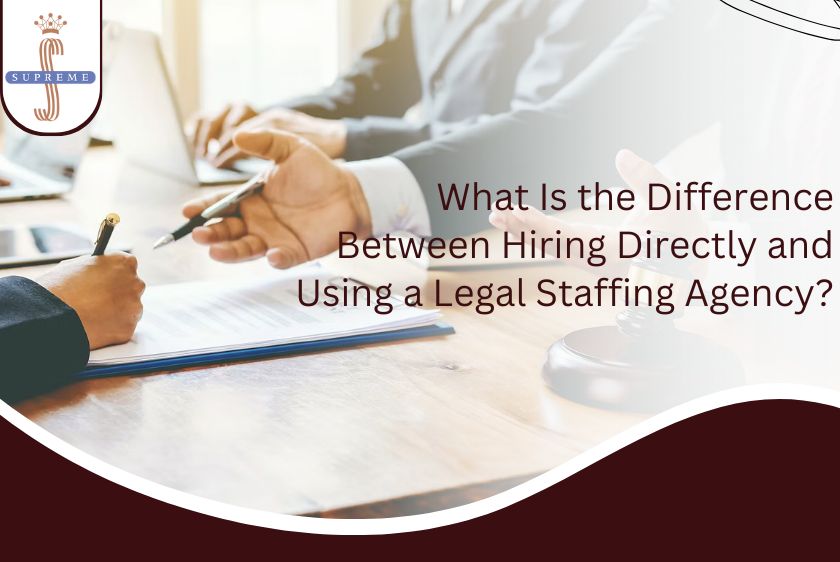Every law firm or legal department knows the importance of hiring the right people. However, when it comes to adding new talent, many firms struggle to decide whether they should manage the hiring process themselves or if partnering with a legal staffing agency is the better choice. In the competitive legal market, your decision can directly impact your success. Therefore, understanding the differences between these approaches is essential, as the wrong choice can lead to lost time, increased costs, and missed opportunities. In this blog, we’ll explore these differences and help you determine which approach will save you time, reduce costs, and ensure you find the right legal professionals for your team.

1. Time and Efficiency
One of the main differences between hiring directly and using a legal staffing agency is the time involved. When you hire directly, your HR team is responsible for the entire recruitment process—writing job descriptions, posting job ads, reviewing resumes, conducting interviews, and negotiating offers. It can be a long and exhausting process, especially if you urgently need legal professionals.
On the other hand, recruitment agencies specialize in finding qualified candidates quickly. They have access to a pool of pre-screened legal talent, which means they can present you with candidates who are ready to step in almost immediately. This significantly cuts down on the time spent searching for the right fit.
2. Access to Expertise
Hiring directly means relying on your in-house team’s knowledge of the legal market, which may not always be comprehensive. While your HR department may be experienced in general hiring practices, they might lack the specialized knowledge required for hiring legal professionals. It could lead to longer hiring times or even the risk of hiring someone who isn’t the best fit for the role.
Legal staffing agencies, however, focus solely on the legal sector. They understand the specific needs of law firms and legal departments and know how to evaluate candidates based on specific skills, experience, and qualifications. This expertise ensures that the candidates presented are well-suited for the legal environment.
3. Cost Considerations
At first, in-house hiring might seem cheaper since you don’t pay agency fees. However, it’s important to consider the hidden costs involved. The longer it takes to find the right candidate, the more you spend on lost productivity, increased workloads for existing staff, and the potential costs of an inefficient hire. Additionally, the resources required for job postings, screening, and interviews can add up quickly.
Legal staffing companies may charge a fee, but they streamline the hiring process by providing qualified candidates faster. This saves time and reduces the risk of hiring someone who doesn’t fit the role, ultimately making the upfront cost worth the investment in the long run.
4. Quality of Candidates
When you hire directly, you may only receive applications from candidates actively looking for work, which limits your talent pool. This might force you to settle for someone who is “good enough” rather than the ideal candidate for the role.
Recruitment agencies, however, have access to both active and passive candidates. Passive candidates are those who are currently employed but open to new opportunities if the right role comes along. These are often highly skilled professionals who aren’t actively searching but may be exactly what your firm needs.
5. Flexibility in Hiring
When you hire directly, you often look for long-term, permanent positions. However, sometimes, your legal department may only need help on a short-term basis, such as for a specific project or during periods of increased workload. In these cases, hiring a permanent employee may not be the most practical option.
A legal staffing agency offers greater flexibility by providing temporary, contract, or project-based staff. It allows you to bring in the right talent for a specific period without committing to a full-time position, giving your firm the ability to adapt as needs change.
6. Risk Management
Making the wrong hire can be a costly mistake. When you handle the hiring process directly, your team is entirely responsible for screening and selecting the right candidate. In case you hired the wrong person, starting over will be time-consuming and expensive.
Legal staffing agencies help reduce this risk by thoroughly vetting candidates through background checks, skill assessments, and reference reviews. Additionally, many agencies offer replacement guarantees, meaning if the hire doesn’t work out, they will quickly find a suitable replacement that saves the cost of repeating the process.
7. Compliance and Legal Risks
Hiring in-house means staying updated with employment laws and regulations, which can be complex and change over time. Mistakes in the hiring process, such as misclassifying employees or violating labor laws, can result in legal troubles, fines, or penalties.
Legal staffing companies are experts in employment law and compliance. They handle the legal aspects of the hiring process, ensuring all regulations are followed, which relieves you of the burden of compliance responsibilities and lowers your risk of legal complications. It helps safeguard your firm from potential compliance issues, allowing you to focus on your core legal work.
Choosing between hiring directly and using a legal staffing agency depends on your company’s needs, timelines, and the type of legal professionals you’re looking for. Direct hiring might be the right choice if you have the resources and time to dedicate to the hiring process. However, if you’re seeking specialized talent quickly or need flexibility in filling roles, partnering with a staffing company can be a more efficient and effective solution.
Ultimately, both approaches have their merits, so consider what your firm needs most: speed, expertise, or control. By calculating these factors, you can make the best choice for your organization.
Read Another Blogs:
8Signs Your Law Firm Needs to Re-evaluate Its Hiring Strategy
5 Reasons Why Law Firms Struggle to Find Qualified IP Talent